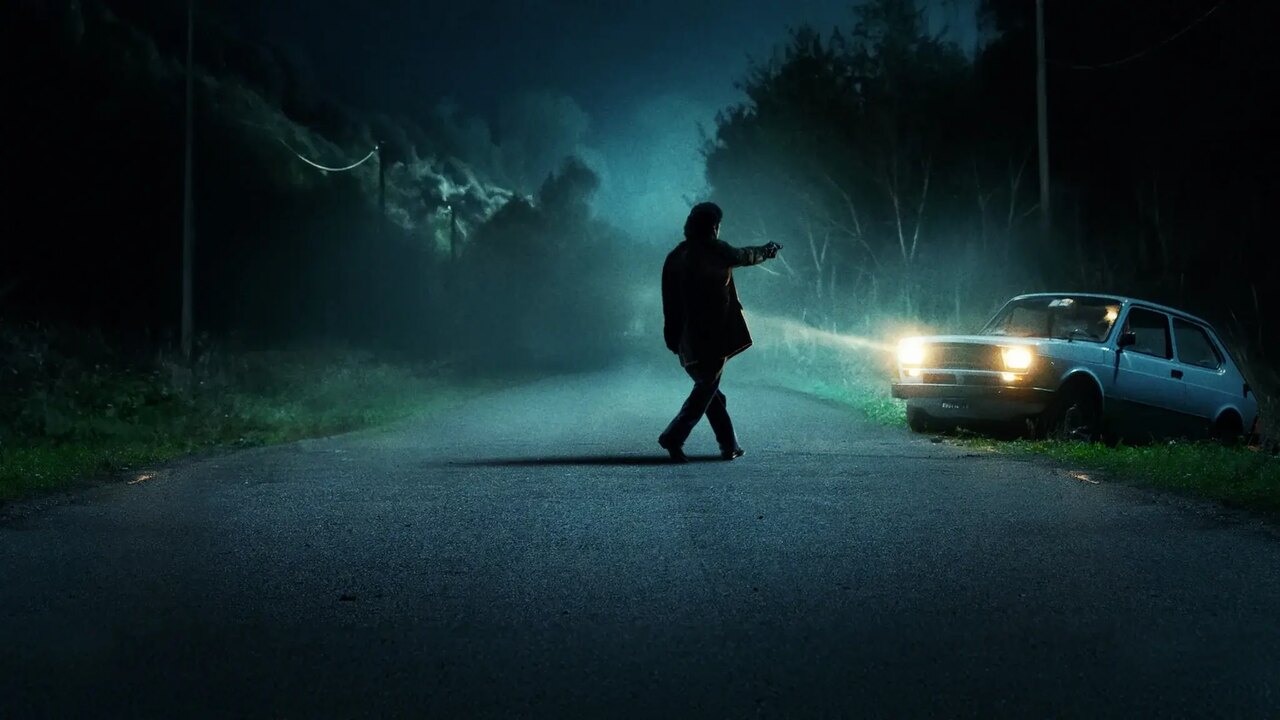
The title of Stefano Sollima's new Netflix limited series might be The Monster of Florence/Il Mostro, but it could also be retitled as Monstrous Men or Mad Men. No, Sollima doesn't really paint every man with evil shades (the policemen and the couples are innocent). Yet, the cruel conditions and conditioning he foregrounds to expose how toxic behavior is inherited from one patriarch to the next were true then and remain true today. Stefano (Marco Bullitta) is constantly under pressure from his father and brother, who often tell him to "man up." Another character, Salvatore (Valentino Mannias), receives this advice from his dad: "If a man wants a certain woman, he takes her." What do Stefano and Salvatore actually want? They want to love other men. They are gay, which doesn't sit well with the society of 1970s–80s Florence. You cannot expect someone like Stefano to fight against his family, culture, or the system. He is so meek, so weak, that it seems as if his whole body works extra hard just to keep him standing. Stefano cannot raise his voice; he doesn't even seem capable of hurting a fly. How, then, will he rebel against such an oppressive environment? And what about Salvatore? He is the epitome of the alpha male—the kind of man who enjoys cuckolding the likes of Stefano to assert his dominance. Yet even a macho like him hides his homosexuality like a scared cat. How can you, then, expect Stefano to be any different? Salvatore is a monster shaped by toxic conditioning, but soon even Stefano is revealed to be... not so innocent.
According to The Monster of Florence, married women are driven to infidelity by toxic men. Stefano allows Salvatore to defile his wife, Barbara (Francesca Olia), and Salvatore exerts tight control over his own partner. These are ultimately insecure men who are not permitted to love in their own way, which is why their frustrations explode in the form of violence. But hey, is Stefano or Salvatore the Monster of Florence — the serial killer who, with a .22 caliber Beretta, targeted couples parked in lovers' lanes? Maybe. Maybe not. Other suspects include Salvatore's brother, Francesco (Giacomo Fadda), and Stefano's brother, Giovanni (Antonio Tintis). The real culprit was never caught, so don't expect a satisfying conclusion. A text at the end, though, mentions that the murders stopped when Salvatore disappeared. Can this be a coincidence? Sollima, who created this show with Leonardo Fasoli, says that any man like Salvatore, Francesco, Giovanni, and Stefano can be considered a monster. One of the characters even locks his wife and daughters in the house. He doesn't let them go outside. Apparently, there were many monsters in Florence who were stifling women in more than one way. The serial killer simply garnered the attention of the police and newspapers. This is undoubtedly a nice concept, and it provides enough juice to a limited series that runs for approximately four hours. However, it's also...insufficient?
There are only so many times one can nod in agreement as the show indicts repressive, virulent men for perpetuating hostility toward women. Eventually, you start wishing for, you know, something else, beyond the repetitive imagery of couples either making out or meeting violent ends. I also wanted to learn more about Barbara, as well as the other characters. How did she convince herself to go out with the brother of a man who sexually assaulted her in the presence of her husband? She must have had some doubts at first. How did she overcome them? There is an announcement on the streets regarding the Soviet troops' march towards Czechoslovakia. What do the characters think about this event? What are their political beliefs? How closely do they follow the news? Barbara is seen on a date inside a movie theater. What kinds of movies does she prefer watching? Does she have a favorite genre or a favorite actor? The fact that Sollima elides personal opinions proves that he is merely interested in establishing a point about regressive practices, which, when you think about it, is quite conventional. And this story, which deals with sex and violence, often verges on cheap exploitation through leering depictions of nudity, scenes of assault, and make-out sessions. These moments rarely linger on screen; sometimes the cut to the next scene is almost instantaneous. Nonetheless, they are filmed with an eye for sensationalism, and the motive, in the end, seems to be to excite the audience. The creators, of course, acknowledge that they have taken creative liberties to tell this story. I just wish those liberties had given rise to something better.
Final Score- [5/10]
Reviewed by - Vikas Yadav
Follow @vikasonorous on Twitter
Publisher at Midgard Times
Get all latest content delivered to your email a few times a month.
Bringing Pop Culture News from Every Realm, Get All the Latest Movie, TV News, Reviews & Trailers
Got Any questions? Drop an email to [email protected]